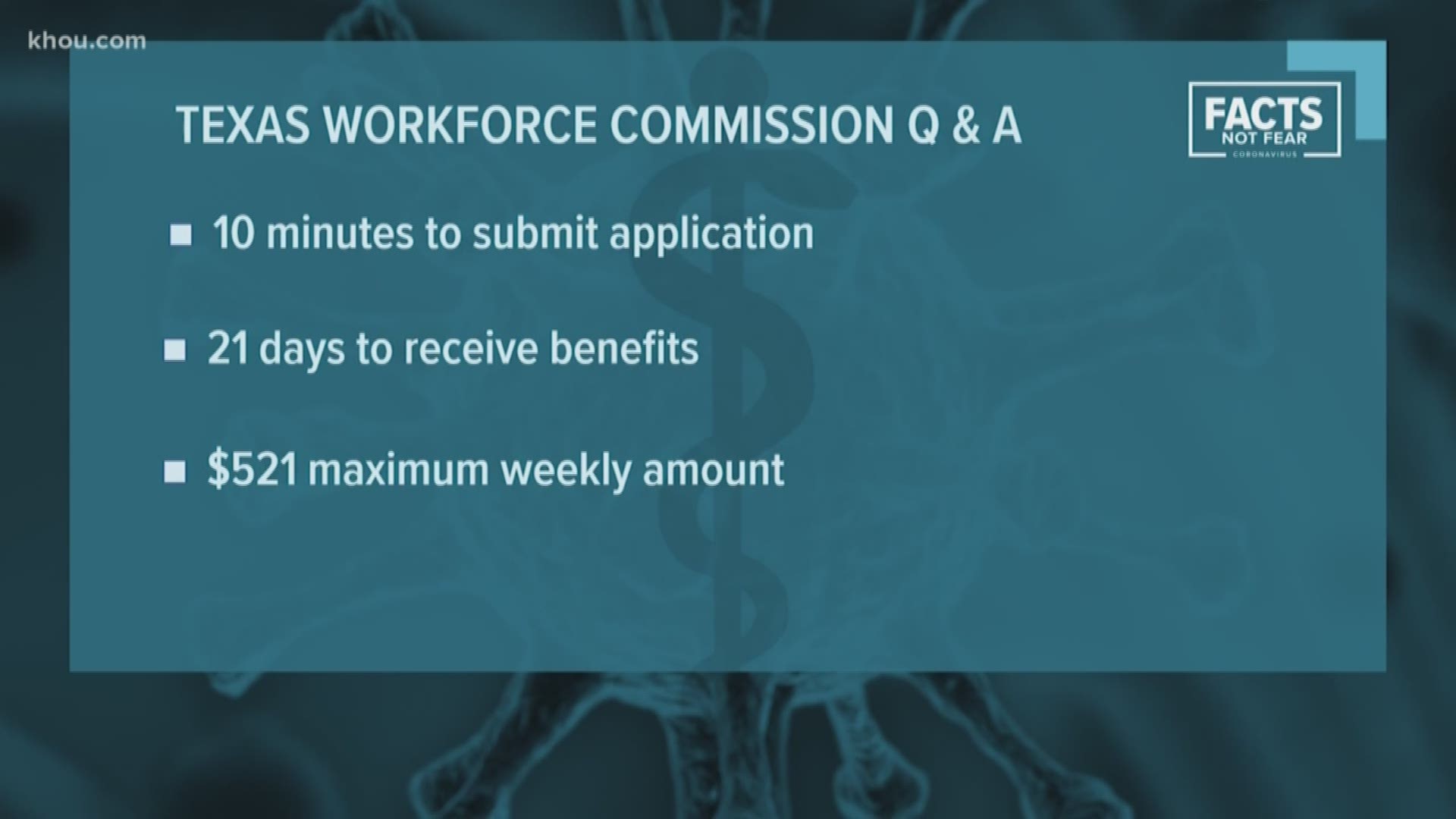HOUSTON — Kevin Cauley is a recently laid off restaurant worker.
"Anything dealing with food, I’ve dealt with,” Cauley said.
He's now cooking up a plan to get jobless benefits since physical unemployment offices are temporarily closed.
“I’m standing on my feet, but it’s getting to the point now that bills are there," Cauley said. "And it’s not coming together.”
It won’t be easy submitting a claim through the Texas Workforce Commission. Its call centers and websites have been inundated thanks to COVID-19 related layoffs and furloughs.
Some reports say the agency is handling 10 times the normal amount.
"We’ve seen a large increase,” said TWC spokesman Cisco Gamez.
The agency’s website is the suggested route for claim seekers as opposed to its phone line.
You begin by clicking on where it says “unemployment benefits” on the homepage, then “apply for benefits” on the next page.
That’s followed by “submit an application” on the next.
That’s where things might slow down as the TWC works to expand server capacity while simultaneously extending hours and increasing call center staff.
"Please be patient with us," Gamez said. "We are doing our best to accommodate everyone. No one will be ignored, everyone who is applying will get an opportunity to apply.”
In some cases, workers not privy to benefits in the past may qualify thanks to the COVID-19 crisis.
“I’m just hoping the benefits come fast,” Cauley said.
We asked the TWC some specific questions regarding the application process. It said it generally takes 10 minutes or less to submit an application. It takes 21 days, on average, to receive benefits if approved, and the maximum weekly amount available is $521.
For more information, visit the Texas Workforce Commission's website.
Coronavirus symptoms
The symptoms of coronavirus can be similar to the flu or a bad cold. Symptoms include a fever, cough and shortness of breath, according to the Centers for Disease Control. Some patients also have nausea, body aches, headaches and stomach issues. Losing your sense of taste and/or smell can also be an early warning sign.
Most healthy people will have mild symptoms. A study of more than 72,000 patients by the Centers for Disease Control in China showed 80 percent of the cases there were mild.
But infections can cause pneumonia, severe acute respiratory syndrome, kidney failure and even death, according to the World Health Organization. Older people with underlying health conditions are most at risk for becoming seriously ill. However, U.S. experts are seeing a significant number of younger people being hospitalized, including some in ICU.
The CDC believes symptoms may appear anywhere from two to 14 days after being exposed.
Human coronaviruses are usually spread through...
- The air by coughing or sneezing
- Close personal contact, such as touching or shaking hands
- Touching an object or surface with the virus on it, then touching your mouth, nose or eyes before washing your hands.
Help stop the spread of coronavirus
- Stay home when you are sick.
- Eat and sleep separately from your family members
- Use different utensils and dishes
- Cover your cough or sneeze with your arm, not your hand.
- If you use a tissue, throw it in the trash.
- Follow social distancing
Lower your risk
- Wash your hands often with soap and water for at least 20 seconds. If soap and water are not available, use an alcohol-based hand sanitizer.
- Avoid touching your eyes, nose, and mouth with unwashed hands.
- Avoid close contact with people who are sick.
- Clean and disinfect frequently touched objects and surfaces.
- If you are 60 or over and have an underlying health condition such as cardiovascular disease, diabetes or respiratory illnesses like asthma or COPD, the World Health Organization advises you to try to avoid crowds or places where you might interact with people who are sick.
Get complete coverage of the coronavirus by texting 'FACTS' to 713-526-1111.

